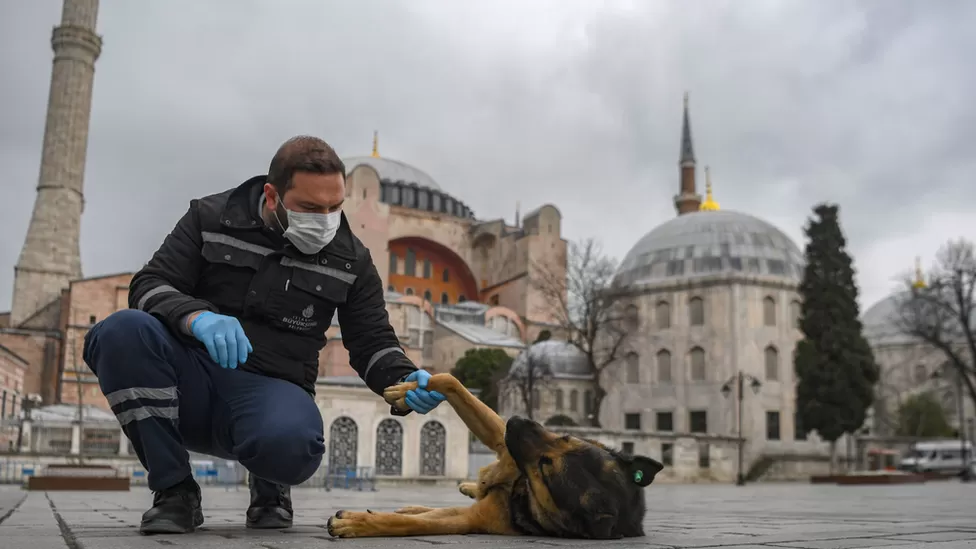« Video of animal shelter worker beating a dog to death leads to protests and questions over treatment of stray animals » reports Andrew Wilks in Al-Monitor.
Visitors to Turkey are often taken aback by the care shown to stray cats and dogs as they stroll streets dotted with improvised kennels and bowls of food. But the killing of a dog last week has opened a fierce row over the treatment of animals.
Footage of a worker beating the dog to death with a shovel at a municipal animal shelter in Konya sparked outrage and led to people protesting outside the facility, some freeing caged animals.
During a visit to the central Anatolian city Nov. 26, President Recep Tayyip Erdogan, who adopted a dog called Leblebi two years ago, spoke out to condemn animal cruelty. “Measures have been taken to prevent it from happening again,” he told his supporters.
“Animals are also entrusted to us by Allah. We will of course benefit from them but we will never torture or mistreat them. … No one should doubt that we will also closely follow this issue,” he continued.
A week earlier, Erdogan had praised Konya municipality, which is run by the president’s Justice and Development Party, as “exemplary” in its animal protection work while arguing that stray animals should be placed in shelters.
Two staff at the Konya shelter were detained after the incident while others were suspended from duty. In Ankara, claims that workers at a shelter in Mamak killed two dogs also elicited protests.
A group of lawyers and animal rights campaigners issued a statement referring to the Konya shelter as a “concentration camp” for animals.
“We will not allow animals to be illegally shot with drug guns, dragged around by sticks with a choke rope around their necks, dragged from their habitats and taken to concentration camps,” the statement said.
It continued, “The mayor, veterinarians, all officials of the Ministry of Agriculture and Forestry who do not fulfil their inspection obligations should be prosecuted and an investigation should be initiated immediately regarding all shelters that ignore the law.”
Lawyer Tugba Gursoy, who heads the Ankara Bar Association’s animal rights branch, said workers at Mamak had attacked her group when they visited the shelter last week. She also said the municipality had been illegally impounding neutered and vaccinated animals from the street.
“We had heard that Mamak municipality had been collecting animals with ear tags for a very long time and we have received videos,” she told the Bianet news site. “They are trying to repel those who detect the illegal actions they are carrying out. They even told us, ‘We take what we want, we don’t take what we don’t want.’ They have no such right.”
The issue of street animals, which has been chronicled in films such as the award-winning documentary « Kedi » (2016) and « Stray » (2020), is highly polarized in Turkey. Animal lovers feed street dogs and cats and lavish affection on them, while others argue that dogs, particularly when roaming in large packs, are dangerous.
Cases of children being attacked are often highly publicized, as are incidents of animal cruelty such as poisonings or mutilations.
The case of Boji, a dog whose life traveling Istanbul’s public transport system was posted on Twitter by the opposition-run municipality, descended into a farce last year when he was reportedly framed for defecating on a metro seat.
A savage attack on a four-year-old girl in December led to Erdogan calling for municipalities to round up strays, even though the two pit bulls involved were not street dogs. “White Turks, take care of your animals,” he added, using a derogatory term for secular Turks.
There are no reliable estimates of the number of strays in Turkey, although a figure of 10 million is often cited in the media. A survey by the Interior Ministry earlier this year found that 39% of respondents felt strays should be removed to shelters while 45% disagreed.
Under a law passed last year, local municipalities are obliged to establish shelters while the penalty for killing an animal was set at a maximum of four years imprisonment. Legislation from 2004 states that stray animals can only be taken in for vaccination, treatment, sterilization and rehabilitation before being released.
There are some 250 animal shelters around the country. Earlier this year, documents were revealed showing more than 1,000 cats and dogs had died over a four-month period at the municipality shelter in Elazig, in southeastern Turkey, between 2020 and 2021, fueling campaigners’ claims of mistreatment and unsanitary conditions.
Selma Pilatin, president of the Kocaeli Animal Rights Association, blamed the portrayal of street animals in the media for their mistreatment and called on municipalities to fulfill their responsibilities.
“Municipalities should work with volunteers,” she said. “Those that do not work with volunteers become Konya … and Mamak.”
Turkey’s opposition, meanwhile, has come down to the side of the country’s street animals. Under a constitutional reform program announced Nov. 28 by six parties was a clause underlining the state’s duty to “prevent cruelty and ill-treatment toward animals.”
Al-Monitor, November 29, 2022, Andrew Wilks, Photo/Ozan KOSE/AFP

